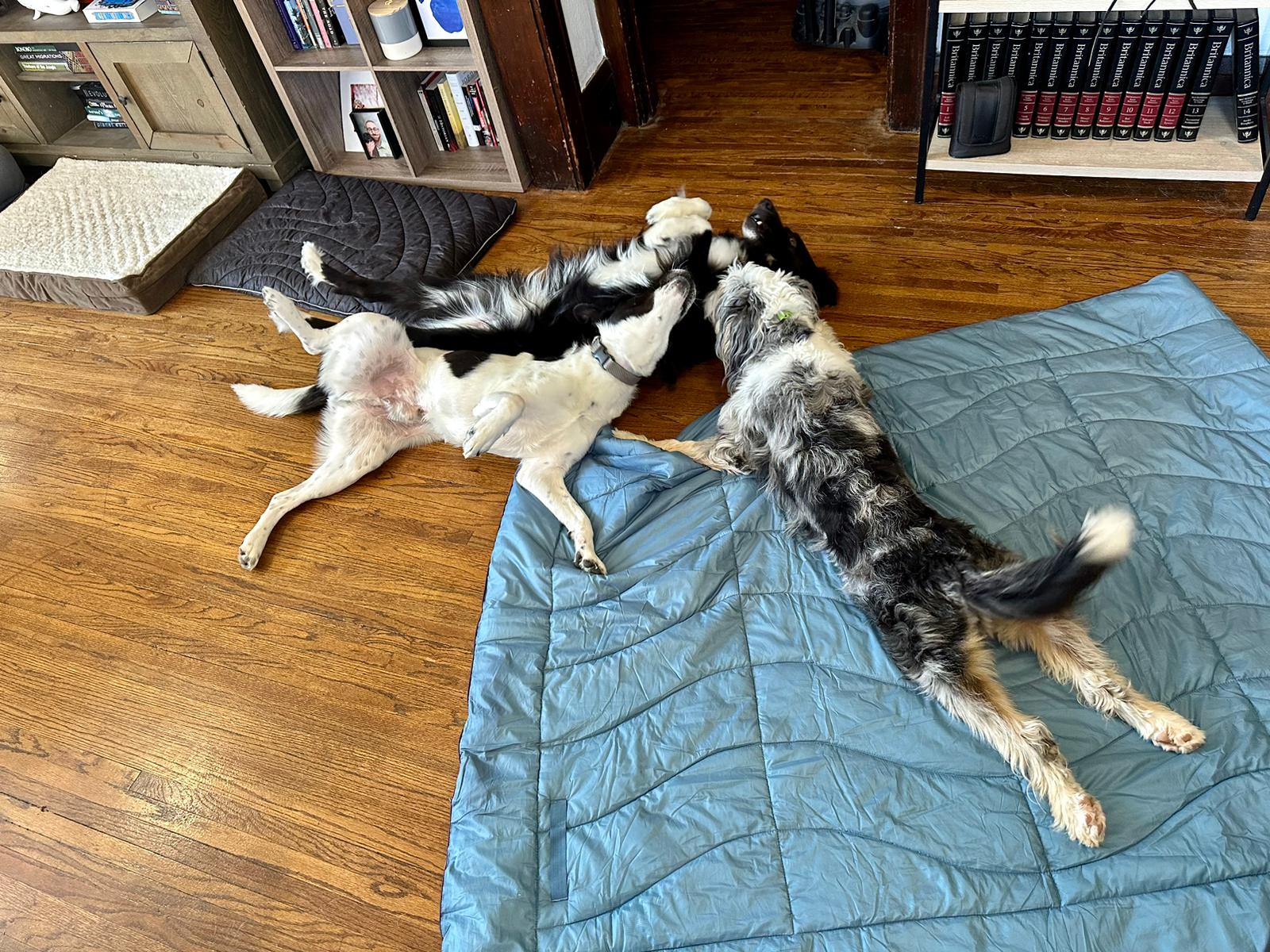Dog Playtime & Socialization
2023-02-07

What is dog play?
By definition, play is the act of engaging in a behavior with no other purpose other than fun, socialization and to satisfy a primary need. Play is used to develop cognitive function, communication skills, stress release, bite inhibition, and to see how far they can push another dog. Play can also reinforce a social hierarchy within a group.
What does proper dog and puppy play look like? The first rule of proper play is that ALL dogs must be willing participants. Play will typically only occur in a relaxed animal. Bouncy exaggerated movements, changes of direction, pawing, licking, mouthing, wrestling, open mouths, chasing, rolling around, loose body language, sharing space and lots of give and take are all examples of proper play. Most proper play is in context and includes behavior that two or more dogs agree upon. During play there should be frequent breaks. A break can be as simple as play bowing before resuming a game of chase or shaking off and getting a drink of water. Although we do like to see a 50/50 rule during play, most dogs can maintain proper play without constant role reversals. With muzzle licking and mounting there is almost never a role reversal however during chase and wrestling you can almost always see the dogs switching places.
If animals do not maintain agreeable behaviors, the playfulness of the interaction can be lost. Play and aggression are often confused as each other and in many cases humans often step in either too early or too late. This can cause frustration or reinforce poor play behaviors.
Now that we have discussed proper play and what it looks like, we can talk about inappropriate play.
There are 5 major reasons for aggression in dogs: Fear Pain Status Frustration Arousal
Each one of these are all potentially involved during play.
Precursors to problems during play: Over-arousal Increased speed Fewer pauses/breaks Increased or elevated noise Hard Stare/ Fixating- seen as a threat Freezing- assessment of a threat Stiffness in body
Different ways a dog can solicit play can potentially cause a problem with certain dogs like stalking. Body slamming may be appropriate in context but should be kept to a minimum. Some dogs don't mind leg biting during play or to solicit play but some dogs see it as rude because it is a predatory behavior similar to stalking. Many socially awkward dogs will gang up on the dog who is in the “losing role” while in a play group. Most dogs do well playing in pairs of two, called a dyad. Often when a third party tries to come join the fun, the two playing will often run off the dog trying to join in.
Common play behaviors viewed as Inappropriate: Mounting- can be sexual, status seeking, or trying to solicit play. Male-male mounting is found to be 16 times more likely than any other combination of genders while playing. This should be stopped immediately.
Bullying/Targeting- the other dog is clearly trying to get away from the situation and the playful nature is not mutual. One dog or a group of dogs may fixate and bully another dog. The dogs fixating should be redirected onto a more suitable playmate or removed from the situation if they do not stop.
Head over/paw over other dog- this is a status seeking behavior. The dog on the receiving end will usually correct the other dog, however if the dog doing this behavior will not stop when corrected, the situation can and will most likely escalate.
Leg biting- predatory behavior can be appropriate during play depending on the other dog's reaction.
Stalking- predatory behavior which can be appropriate in context but it depends on the other dog's reaction to the behavior.
Grab & Hold other dog's neck area- can be appropriate in context if the dog being grabbed is not showing any signs or stress. If the dog grabbing does a shake of their head while holding, this should be stopped immediately.
Vertical Play- when dogs are chest to chest on their hind legs. Usually this is accompanied by open mouths or “face fighting”. This should be avoided altogether because it usually leads to a rise in vocalization, growling and is also a status seeking behavior.
Head Shaking- predatory behavior and inappropriate during play no matter what body part the dog is grabbing. Typically due to over-arousal, the dog grabbing the other dog will shake their head back and forth. This can cause serious damage and stress to the dog on the receiving end. Should always be discouraged and stopped immediately.
Ready for Dog Training?
Tell Us About Yourself
Tell Us About Your Dog
Find Out How We Can Help
We know your dog is unique. Before making any recommendations, we need to evaluate your dog's needs.
Connect with a team member for more information